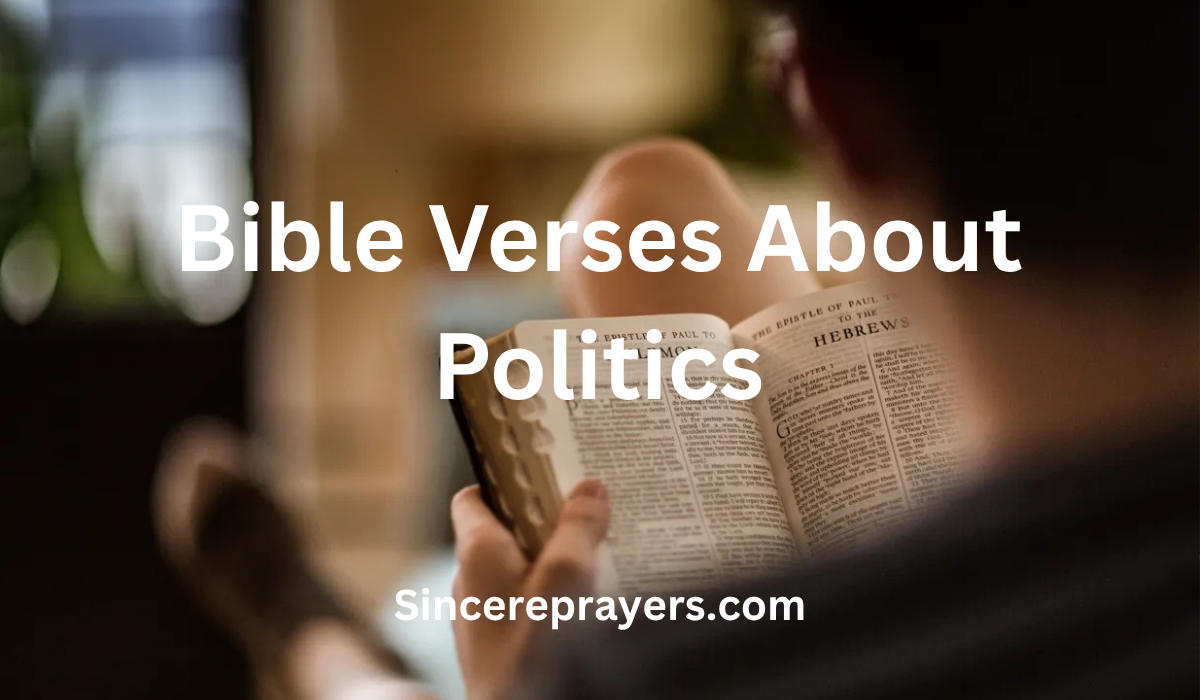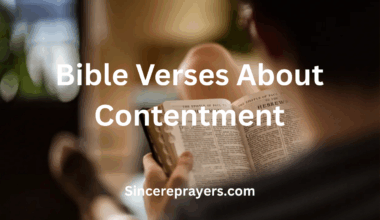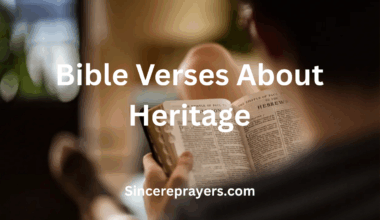Politics has always been a part of human civilization shaping societies, guiding laws, and influencing lives. Yet for Christians, politics is more than power, strategy, or policy, it’s about stewardship, justice, and truth. The Bible may not mention “politics” in the modern sense, but it provides timeless wisdom for leaders, citizens, and communities on how to act justly and govern righteously under God’s authority.
In today’s polarized world, it’s easy for political opinions to divide families, churches, and nations. But Scripture calls believers to rise above worldly conflict, remembering that our ultimate allegiance is to God’s kingdom. Political involvement is not inherently corrupt or ungodly, it becomes dangerous only when personal ambition replaces divine purpose. The Word of God reminds us that leadership is a sacred responsibility and governance should always reflect the character of God fairness, humility, and righteousness.

As Christians, we are called to pray for our leaders, to seek peace in our nations, and to act with wisdom and discernment when making political decisions. Whether we are voting, serving, or simply observing, our role must be anchored in truth and guided by love. The Bible teaches that power without righteousness leads to oppression, while humility in leadership brings peace and prosperity.
This collection of 35 powerful Bible verses about politics offers insight into God’s perspective on authority, justice, leadership, and moral integrity. Each verse reveals divine principles that transcend party lines and human systems. From ancient kings to modern leaders, the message remains clear God establishes rulers, judges actions, and expects leaders to rule with righteousness. These Scriptures will inspire you to see politics not through the lens of division, but as an opportunity to honor God in the public square.
35 Most Powerful Bible Verses About Politics in 2025
1. Proverbs 29:2
“When the righteous thrive, the people rejoice; when the wicked rule, the people groan.”
This verse captures the moral heartbeat of governance. Righteous leadership brings peace and prosperity, while corruption breeds suffering. Godly rulers lead with compassion, truth, and integrity—producing joy among their people. Wicked leaders, however, oppress and exploit, causing grief and unrest. This Scripture reminds believers to pray for and support righteous leaders who govern with justice, for their wisdom blesses not only individuals but entire nations.
2. Daniel 2:21
“He changes times and seasons; he deposes kings and raises up others.”
Daniel reminds us that political power is not ultimately controlled by human will but by divine sovereignty. God orchestrates leadership transitions to fulfill His purposes, even when we cannot understand them. This truth humbles both rulers and citizens, teaching that no authority stands apart from God’s will. In every election, revolution, or regime, God’s hand is at work—guiding history according to His divine plan.
3. Romans 13:1
“Let everyone be subject to the governing authorities, for there is no authority except that which God has established.”
Paul teaches believers to respect civil authority as part of God’s divine order. Even imperfect governments operate under His ultimate sovereignty. Submission does not mean blind obedience—it means honoring lawful authority while recognizing God’s supremacy above all. This verse encourages Christians to be good citizens, to pray for leaders, and to uphold laws that promote peace and justice.
4. Proverbs 21:1
“In the Lord’s hand the king’s heart is a stream of water that he channels toward all who please him.”
This proverb reveals the invisible influence of God over human rulers. Even kings and presidents are instruments in His hands. God can guide decisions, shape hearts, and direct nations toward His will. Believers should take comfort knowing that while earthly politics seem chaotic, divine sovereignty ensures that every outcome serves His eternal purpose. Prayer remains the most powerful political act a believer can offer.
5. Micah 6:8
“He has shown you, O mortal, what is good. And what does the Lord require of you? To act justly and to love mercy and to walk humbly with your God.”
This verse outlines the moral foundation of leadership and citizenship. Justice, mercy, and humility are not just personal virtues—they are essential for political integrity. Leaders who embody these qualities bring healing to nations. As believers, we must reflect these traits in civic engagement, policy decisions, and daily life, ensuring that our political actions align with God’s heart for righteousness and compassion.
6. 1 Timothy 2:1–2
“I urge, then, first of all, that petitions, prayers, intercession and thanksgiving be made for all people—for kings and all those in authority.”
Paul’s instruction emphasizes that prayer for political leaders is a spiritual duty, not an option. Christians are called to intercede for all who hold authority, regardless of their beliefs or policies. By praying for wisdom, peace, and righteousness in leadership, we invite God’s influence into governance. This practice cultivates humility and unity, ensuring that politics becomes a channel for divine peace rather than human pride.
7. Psalm 33:12
“Blessed is the nation whose God is the Lord, the people he chose for his inheritance.”
National prosperity is tied to spiritual alignment with God. When leaders and citizens honor Him, their policies and decisions reflect righteousness. But when nations abandon God’s truth, corruption and moral decay follow. This verse reminds us that political stability and blessing flow from obedience to divine authority. True success in governance is not found in power or wealth but in a nation’s reverence for the Lord.
8. Isaiah 9:6–7
“And the government will be on his shoulders… Of the greatness of his government and peace there will be no end.”
Isaiah prophesies the coming of Christ, the ultimate ruler whose kingdom is founded on justice and righteousness. Earthly governments rise and fall, but Christ’s dominion is eternal. His leadership embodies peace, fairness, and divine authority. This verse gives believers hope that one day all political systems will yield to His perfect rule, reminding us to place our ultimate trust in the King of kings.
9. Proverbs 16:12
“Kings detest wrongdoing, for a throne is established through righteousness.”
A government built on injustice cannot stand. Proverbs teaches that integrity is the foundation of enduring leadership. Wise rulers reject corruption because they understand that moral decay erodes public trust and stability. For believers involved in politics or leadership, this verse is a call to guard personal integrity. When righteousness guides governance, God strengthens and sustains that authority for the good of all.
10. Titus 3:1
“Remind the people to be subject to rulers and authorities, to be obedient, to be ready to do whatever is good.”
Paul urges Christians to demonstrate civic responsibility by respecting laws and contributing to the welfare of society. Faith should not make us rebellious but exemplary citizens. This does not mean condoning injustice; rather, it calls for peaceful cooperation and positive influence. By living honorably within society, believers reflect Christ’s character and demonstrate that good citizenship is a form of Christian witness.
11. Jeremiah 29:7
“Seek the peace and prosperity of the city to which I have carried you into exile. Pray to the Lord for it, because if it prospers, you too will prosper.”
Even while living under foreign rule, God’s people were called to pray for their nation’s welfare. This verse teaches believers to engage constructively in their communities, seeking peace and prosperity through prayer and godly conduct. Political stability benefits everyone, and when believers advocate for justice and moral governance, they contribute to the flourishing of their society. God blesses nations that pursue peace through His principles.
12. Deuteronomy 16:19
“Do not pervert justice or show partiality. Do not accept a bribe, for a bribe blinds the eyes of the wise.”
God commands fairness in judgment and governance. Corruption, bribery, and favoritism distort truth and lead to injustice. For leaders, this verse is a solemn reminder that authority must be exercised with integrity. For citizens, it’s a call to support honest governance and resist unethical systems. Justice rooted in truth safeguards freedom, ensures equality, and upholds the moral fabric of a nation.
13. Psalm 75:7
“It is God who judges: He brings one down, he exalts another.”
This verse affirms God’s sovereign control over political leadership. Human ambition and manipulation cannot override divine will. God promotes or removes rulers according to His purposes. This truth should humble every leader and comfort every believer. Even when politics appears unjust, God’s ultimate judgment prevails. He sees the hidden motives of rulers and ensures that His justice is carried out in His perfect timing.
14. Proverbs 11:14
“For lack of guidance a nation falls, but victory is won through many advisers.”
Wise counsel is essential in political leadership. A nation led by impulsive or prideful leaders is destined for instability, but those who seek godly advice prosper. Collaboration and humility in governance reflect divine wisdom. This verse encourages leaders to surround themselves with honest, god-fearing counselors and reminds citizens to value discernment over popularity when supporting policies or officials.
15. Matthew 22:21
“So give back to Caesar what is Caesar’s, and to God what is God’s.”
Jesus’ response to the Pharisees reveals the balance between spiritual and civil responsibility. Christians are called to respect governmental authority while maintaining ultimate loyalty to God. Paying taxes or obeying laws does not compromise faith—it demonstrates order and respect. Yet, when human authority conflicts with divine truth, obedience to God must prevail. Christ teaches us to honor both realms wisely and faithfully.
16. 2 Samuel 23:3–4
“When one rules over people in righteousness, when he rules in the fear of God, he is like the light of morning at sunrise.”
King David describes righteous leadership as radiant and life-giving. When leaders govern with reverence for God, their influence brings clarity, hope, and renewal to a nation. Such leadership dispels corruption like light drives out darkness. God-fearing rulers are blessings to their people, and citizens should pray for those who lead with humility, wisdom, and moral courage.
17. Isaiah 1:17
“Learn to do right; seek justice. Defend the oppressed. Take up the cause of the fatherless; plead the case of the widow.”
Political authority carries a moral mandate—to protect the vulnerable and uphold justice. Isaiah’s words condemn systems that neglect the poor or exploit the powerless. True governance reflects God’s compassion for the marginalized. This verse calls both leaders and citizens to advocate for fairness, equality, and mercy. When politics aligns with God’s justice, nations experience restoration and peace.
18. Psalm 72:1–2
“Endow the king with your justice, O God, the royal son with your righteousness.”
This psalm is a prayer for righteous leadership. It recognizes that political wisdom and moral strength come only from God. Leaders need divine direction to govern justly and compassionately. When justice flows from God’s character, it uplifts society and secures lasting peace. Believers should continually pray that those in authority are guided by righteousness and not by selfish ambition or pride.
19. Matthew 20:26–28
“Whoever wants to become great among you must be your servant.”
Jesus redefines political greatness—not as dominance, but as service. True leadership mirrors the humility of Christ, who came to serve rather than be served. This teaching dismantles the pride often found in politics and reminds believers that authority is stewardship, not entitlement. Servant leadership produces trust and unity, while self-centered rule breeds division and corruption.
20. Proverbs 28:2
“When a country is rebellious, it has many rulers, but a ruler with discernment and knowledge maintains order.”
This verse contrasts chaos and stability in governance. Frequent leadership changes often reflect moral confusion and rebellion, while wise rulers sustain peace. Discernment—rooted in godly wisdom—preserves order and prosperity. Political stability depends not on power struggles, but on righteous leadership guided by truth. This principle challenges leaders to rule with understanding and encourages citizens to value wisdom over popularity.
21. Psalm 94:20
“Can a corrupt throne be allied with you—a throne that brings on misery by its decrees?”
The psalmist exposes the incompatibility of corruption with divine authority. Any government that promotes injustice or oppression stands opposed to God’s will. This verse warns leaders that power detached from righteousness is destined for ruin. It also comforts believers by affirming that God does not overlook wicked governance—He will hold every corrupt system accountable and vindicate those who suffer under it.
22. Isaiah 33:22
“For the Lord is our judge, the Lord is our lawgiver, the Lord is our king; it is he who will save us.”
This verse beautifully unites all branches of divine authority—judicial, legislative, and executive—under the rule of God. While human governments reflect these roles imperfectly, God’s governance is perfect, righteous, and redemptive. Politics often fails where divine rule succeeds. This Scripture assures believers that ultimate justice and salvation come from the Lord, not from political systems or earthly leaders.
23. Proverbs 29:4
“By justice a king gives a country stability, but those who are greedy for bribes tear it down.”
Justice builds strong nations, while greed destroys them. This proverb emphasizes that political corruption weakens the foundation of any society. Leaders who govern with honesty and fairness create security and unity among citizens. God honors governments that uphold righteousness and condemns those that exploit the poor for gain. Justice is the stabilizing force of any enduring political system.
24. Zechariah 7:9–10
“Administer true justice; show mercy and compassion to one another.”
God calls leaders and citizens alike to blend justice with mercy. A government driven solely by law without compassion becomes oppressive, while unchecked mercy without truth leads to moral decay. This verse presents a divine balance—governance must protect the weak, ensure fairness, and reflect God’s heart for humanity. Political systems that embody both justice and mercy become instruments of peace and restoration.
25. Ecclesiastes 5:8
“If you see the poor oppressed and justice and rights denied, do not be surprised at such things.”
Solomon offers a sobering reflection on the reality of corruption in earthly systems. Human authority often abuses power, but believers must not despair. God remains the ultimate judge who will correct injustice in His time. This verse encourages discernment and perseverance—it reminds us that politics is flawed because humanity is flawed, yet divine justice will always have the final word.
26. Psalm 2:10–11
“Therefore, you kings, be wise; be warned, you rulers of the earth. Serve the Lord with fear and celebrate his rule with trembling.”
God warns rulers to exercise authority with humility and reverence. Political power should never lead to arrogance or rebellion against God. True wisdom in governance begins with fear of the Lord. When leaders honor God, they promote righteousness; when they oppose Him, their rule becomes unstable. This verse calls both leaders and citizens to respect divine authority above all earthly power.
27. Exodus 18:21
“Select capable men from all the people—men who fear God, trustworthy men who hate dishonest gain.”
Moses receives guidance from Jethro on appointing leaders who embody moral integrity. Competence alone is not enough; character and reverence for God are essential. Political systems thrive when leaders value honesty over profit and accountability over ambition. This verse offers timeless criteria for leadership selection—fear God, reject corruption, and lead with wisdom and humility.
28. Proverbs 14:34
“Righteousness exalts a nation, but sin condemns any people.”
National greatness is not measured by wealth or power but by moral integrity. Righteousness uplifts nations, attracting God’s favor, while sin brings decline. This verse is both a warning and a promise—if a people honor God’s truth, they will prosper; if they reject it, destruction follows. Political reform begins with moral renewal in both leaders and citizens.
29. Matthew 5:9
“Blessed are the peacemakers, for they will be called children of God.”
Politics often breeds division, but God calls His people to be peacemakers. Peacemaking is not passive—it’s an active pursuit of reconciliation, truth, and justice. This verse encourages believers to promote unity rather than conflict, both in society and leadership. Those who bring peace into political discussions or decisions reflect the very heart of God and manifest His kingdom on earth.
30. Acts 5:29
“We must obey God rather than human beings.”
This declaration by Peter and the apostles draws a clear line between divine authority and human command. While Christians respect government, obedience to God takes precedence when laws contradict His Word. This verse highlights the believer’s duty to uphold moral conviction even in political conflict. True courage in politics begins when faith guides conscience above fear or pressure.
31. James 3:17
“But the wisdom that comes from heaven is first of all pure; then peace-loving, considerate, submissive, full of mercy and good fruit.”
Godly wisdom is the antidote to political corruption and pride. Leaders guided by heavenly wisdom act with purity, fairness, and compassion. Political debates often stir anger and division, but divine wisdom promotes understanding and cooperation. This verse reminds Christians to pray that their leaders and citizens alike are guided by the peace-filled wisdom that only comes from God.
32. Colossians 3:23–24
“Whatever you do, work at it with all your heart, as working for the Lord, not for human masters.”
For Christians in government or civic service, this verse sets the standard of excellence and integrity. Political service should be viewed as ministry to God, not merely a career or power pursuit. When believers work wholeheartedly for God’s glory, their influence transforms systems and institutions. Every political act, when done righteously, becomes an offering of worship to the Lord.
33. Psalm 146:3
“Do not put your trust in princes, in human beings, who cannot save.”
This verse calls believers to guard against political idolatry. No leader, policy, or system can provide ultimate security or salvation. Trusting in human power leads to disappointment, but trusting in God brings lasting peace. Christians must engage politically without worshiping politicians. God alone is the true ruler who sustains justice and delivers His people from oppression.
34. Isaiah 10:1–2
“Woe to those who make unjust laws, to those who issue oppressive decrees.”
God condemns leaders who exploit the weak through unfair legislation. Political authority is a sacred trust meant to protect the vulnerable, not to burden them. This warning challenges lawmakers and judges to govern with righteousness and compassion. Unjust laws bring divine judgment, but equitable policies honor God and uplift society. Justice in lawmaking reflects God’s own moral nature.
35. Revelation 19:16
“On his robe and on his thigh he has this name written: King of kings and Lord of lords.”
This final verse reminds us that all earthly power is temporary, but Christ’s rule is eternal. No government, empire, or leader will ever surpass His authority. Jesus reigns supreme over all nations, ensuring that justice, truth, and righteousness will ultimately prevail. Believers can rest confidently knowing that the destiny of politics—and of the world—is securely held in the hands of the true King.
Conclusion
Politics will always be a complex arena of ambition, ideals, and human imperfection. Yet, Scripture reminds us that God remains sovereign over every government, policy, and decision. From kings and presidents to judges and lawmakers, every authority operates under His supreme oversight. The Bible teaches us that the measure of good leadership is not charisma or power but justice, humility, and faithfulness to God’s truth.
As believers, our engagement in politics must reflect the character of Christ. We are not called to serve party interests but kingdom principles justice, mercy, and righteousness. Praying for leaders, voting with discernment, and standing for truth are all expressions of godly citizenship. When we live out our faith in civic spaces, we become salt and light to a society desperate for moral clarity and compassion.
Ultimately, the hope of the world does not rest in governments but in Jesus Christ, the King of kings. His eternal kingdom will one day replace every corrupt and broken system with perfect peace and justice. Until that day, we are called to live faithfully upholding truth, promoting righteousness, and demonstrating love in both our words and our politics. Every believer has a divine role to play in shaping the moral conscience of their nation, ensuring that politics remains a platform for God’s glory rather than human pride.





